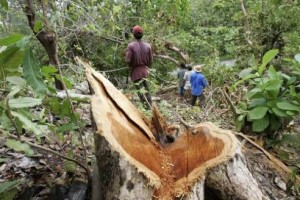To increase the incomes of many of the billion forest-dependent people worldwide the current model for investment in forests must be turned on its head. An initiative of unprecedented scale, led by The Forests Dialogue (TFD), IUCN and the Growing Forests Partnerships (GFP), has found that optimising the benefits and productivity of forests requires moving from a ‘resource-led’ model to a ‘rights-based’ system of ‘locally controlled forestry’, that places local control of forests at the heart of the investment process.
 Over the last three years, TFD, partnering with IUCN, organised a series of country level dialogues engaging over 400 forest owners, investors, NGOs, governments and intergovernmental agencies. The resulting report, “Investing in Locally Controlled Forestry”, launched recently at IUCN’s World Conservation Congress, shows that with the right processes in place, and under the right conditions, almost any individual or group can build a successful forest enterprise.
Over the last three years, TFD, partnering with IUCN, organised a series of country level dialogues engaging over 400 forest owners, investors, NGOs, governments and intergovernmental agencies. The resulting report, “Investing in Locally Controlled Forestry”, launched recently at IUCN’s World Conservation Congress, shows that with the right processes in place, and under the right conditions, almost any individual or group can build a successful forest enterprise.
“A first step is to recognize that many forests and landscapes are inhabited by people with some form of land rights,” says Chris Buss, Senior Programme Officer for IUCN’s Global Forest and Climate change Programme“Investors are increasingly aware they must respect these rights through recognized processes, although the practical implications of such processes have until now received less attention.”
The learning from this initiative demonstrates that these processes often result simply in compensation for loss of access to land or resources, rather than a genuine shared enterprise. In contrast, a “rights-based” system places local control at the heart of the process. Under this system, the people who own or have rights over the forest are the ones who seek investors and partnerships for managing their natural resource assets.
“The rights-based approach recognizes local people’s autonomy and their rights to determine the land’s destiny and to gain income from its effective management,” says Minni Degawan, Project Coordinator for KADIOAN, an Indigenous Peoples Organisation based in the Philippines. “Empowering local people to make decisions on commercial forest management and land, with secure tenure rights, the ability to build their own organizations and access to markets and technology can be a highly effective way of raising incomes and protecting forestry resources.”
“Communities, governments and investors all stand to gain from investing in locally controlled forestry. However, launching a commercially viable enterprise is not without its own challenges and requires adjustments to conventional investment approaches,” says Peter Gardiner, Natural Resource Manger for Mondi. “To facilitate this process, the Growing Forest Partnerships which includes IUCN and TFD have developed a practitioners’ manual, to be released later this month, which offers investors and rights holders a step-by-step guide to negotiating commercial agreements.”
IUCN and its partners from Growing Forest Partnerships is also continuing to gather further information from ILCF projects around the world and exploring the possibility of launching a pilot project based on best practices.
